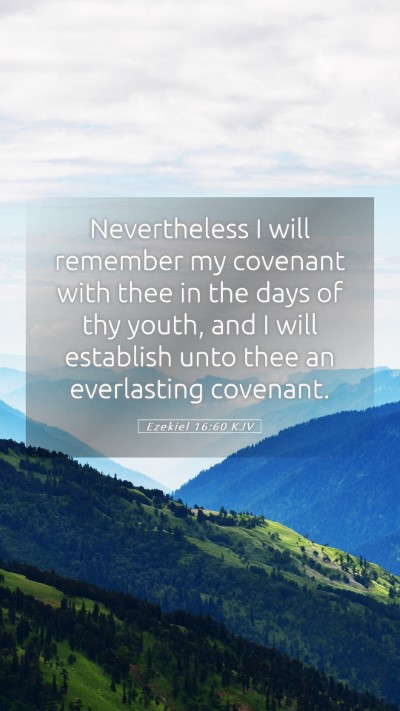Ezekiel 16:60 - Understanding the Meaning of This Bible Verse
Ezekiel 16:60 is a powerful verse that speaks to the theme of restoration and covenant faithfulness.
The verse reads: "Nevertheless I will remember my covenant with thee in the days of thy youth, and I will establish unto thee an everlasting covenant."
This scripture not only reflects God's unwavering commitment to His people but also invites believers to explore the significance of the covenant throughout Biblical history.
Insights from Public Domain Commentaries
In understanding Ezekiel 16:60, we draw on the insights of esteemed commentators such as
Matthew Henry, Albert Barnes, and Adam Clarke.
Their explorations provide a foundation for comprehensive Bible study insights and a deeper biblical exegesis of the text.
-
Matthew Henry emphasizes God's faithfulness despite Israel's unfaithfulness.
He explains that even when Israel strayed from God's ways, He lovingly remembered His covenant.
This reflects God's enduring grace and commitment to restore His people.
-
Albert Barnes focuses on the everlasting nature of God's covenant.
He points out that this verse assures the Israelites of a continued relationship, grounded in God's promise.
Barnes highlights that divine covenants are pivotal in understanding the Bible's narrative and offer comfort to believers.
-
Adam Clarke addresses the historical context, noting the significance of the metaphor of a marital relationship.
Clarke explains that Ezekiel uses rich imagery to depict Israel's infidelity but assures them of God’s unwavering faithfulness and intention to restore.
Contextual Analysis
To fully grasp Ezekiel 16:60, it’s crucial to consider the broader context of the chapter, where God describes His initial care for Israel, likening them to an abandoned child who grew into a beautiful woman.
Despite Israel's unfaithfulness portrayed in the metaphor of adultery, God's promised restoration signifies a deep love and longing for reconciliation.
-
Historical Context: The verse reflects God's relationship with Israel during a tumultuous period. Understanding the background of Jerusalem's siege brings depth to the interpretation of God's promise.
-
Covenantal Promises: This verse connects with the overarching theme of God's covenant throughout scripture, especially in relation to the Old Testament and how it foreshadows the New Covenant.
Application of Ezekiel 16:60
The application of this verse is rich for personal and communal reflections among Bible study groups.
Believers are encouraged to understand that no matter past failings, God is always ready to remember His promises and restore those who repent and return to Him.
-
How does remembering God’s faithfulness encourage us in times of spiritual struggle?
-
In what ways can we actively seek restoration in our lives and relationships, reflecting the covenant love modeled by God?
Cross References
To deepen your study, consider the following Bible verses related to Ezekiel 16:60:
- Genesis 17:7 - God's covenant with Abraham.
- Jeremiah 31:31-34 - The promise of a new covenant.
- Romans 11:26-27 - Paul's reference to God's ongoing covenant with Israel.
Conclusion
In summary, Ezekiel 16:60 is a profound declaration of God's unwavering promise to His people, emphasizing themes of restoration and faithfulness.
The insights gained from respected commentaries provide a well-rounded understanding of the text, allowing for a deeper appreciation of God's love and commitment through the covenant.
For those exploring the meaning of Bible verses, Ezekiel 16:60 offers rich opportunities for reflection, discussion, and application within personal and group Bible studies.


